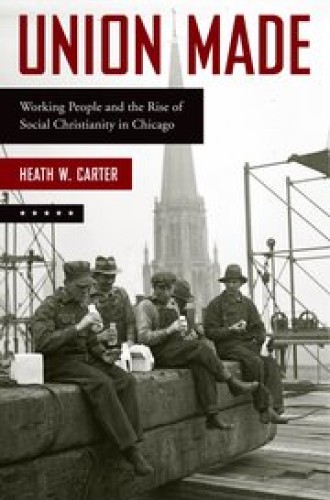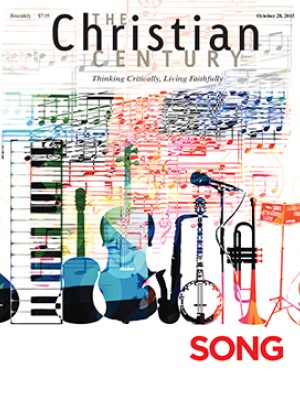Working-class Christians
Of all the people who turned out in support of the “Fight for 15” rallies last April, 33-year-old McDonald’s worker Jorel Ware from Brooklyn was most surprised about the ministers.
In more than 230 cities across the country, an estimated 60,000 fast food workers had walked off their jobs, demanding that the minimum wage be raised to $15 an hour. It was the largest protest of its kind in American history, part of a much longer campaign spearheaded by the Service Employees International Union, which had already helped pass laws for livable minimum wages in Seattle, New York, and San Francisco. In the month after the April demonstrations, SEIU helped Los Angeles join that list.
But according to Ware, it was the presence of a handful of priests, rabbis, ministers, and imams that had proved most important in the minimum-wage campaign. Only the support of religious leaders, Ware claimed, “makes people understand that this is a big thing.” Without them, he said, “We really can’t survive.”
Read our latest issue or browse back issues.
Though voiced about a contemporary situation, Ware’s lament is quite old. Working people have been calling on religious leaders to take up their cause since the dawn of the industrial age. Their cries have not only offered some of the most potent critiques of economic inequality, but have also indicted American Christianity for its often cozy relationship with capitalism. Heath Carter shows that although working people have more often made these pleas while sitting in pews than standing at pulpits, they have been some of Christianity’s most important theological innovators.
Chicago provides the backdrop for Carter’s narrative, and there is no better city for exploring the moral dimensions of industrialization. A frontier outpost with a mere 4,000 residents at the time of its incorporation in 1837, Chicago ballooned to a population of more than 1.5 million by 1900. The intervening years saw a number of remarkable transformations that Carter covers in impressive detail.
One of the most enjoyable aspects of Union Made is the way Carter illustrates that religion was central to Chicago’s social, cultural, and political development. The book situates the founding of the city’s historic congregations alongside its early growth. Most of the earliest churches “met in simple frame buildings and paid their ministers only marginally more than local artisans,” but by the time of the Civil War Chicago’s religious landscape had become deeply stratified by class. Humble wooden sanctuaries were replaced by opulent gothic edifices that were built with the funds of a new industrial elite, many of whom also paid large salaries to the most learned Protestant ministers. Carter argues that Chicago’s wage earners increasingly looked upon the Christian church as a bourgeois domain where well-paid divines sanctified the inequality that surrounded them.
The church’s fealty to its wealthiest members became a point of contention in the spectacular labor uprisings that defined 19th-century Chicago. Tracing the histories of Chicago’s first campaign for an eight-hour day in the mid-1860s, the infamous Haymarket conflict of 1886, and the Pullman strike of 1894, Carter deftly reconstructs the religious arguments that union leaders made in support of organized labor in these battles. For Carter, this Christian defense of trade union activity is more than coalition building. It is the public display of a vibrant “working-class social Christianity” that animated and sustained Christian wage earners throughout the city.
Forged in factories and articulated in union halls and on picket lines, this workers’ gospel provided a powerful alternative to the free market theology that typically emanated from the pulpits. It emphasized Christianity’s egalitarian themes, exalting Jesus as a carpenter who always sided with the lowly and the oppressed. When established congregations failed to follow their Savior’s lead, workers had few qualms about finding more amenable sanctuaries, even going so far as to found a number of independent “labor churches,” whose histories Carter excavates.
According to previous scholarship, the Social Gospel emerged in the first decade of the 20th century among a handful of urban, primarily Protestant ministers who were in equal parts moved by, incensed about, and afraid of the class conflict that seemed to define industrial capitalism. Union Made calls this account into question. The book’s concluding chapters reframe the Social Gospel’s supposed rise, highlighting how the industrial councils and labor committees formed by a number of ecclesiastical associations throughout the early 1900s were in many instances belated responses to theological conversations the Catholic and Protestant workers had been having for nearly half a century.
Carter’s singular contribution is to recast figures long associated with the history of labor as main characters in the history of American Christianity. They may have lacked formal religious training, if they had any education at all, but people like National Labor Union founder Andrew Cameron, blacksmith organizer James Kline, and anarchist Albert Parsons had important thoughts about the divine. These were individuals of considered faith who mounted a sustained and partially successful campaign to remind the church to look after the orphaned, the widowed, and the poor.
Gracefully written and richly illustrated, Union Made is an eminently accessible text. It is also of pressing relevance in our present age of staggering prosperity and shameful poverty, an age in which rates of inequality, some economists claim, exceed those of the years that Carter studies. More than half of today’s public school children now come from families living below the poverty line; median household incomes have not risen in more than a decade; and in a number of cities unemployment rates remain in the double digits.
In this climate, Union Made is an invitation for communities of faith to determine their stances on issues of economic justice. As one Chicago-area McDonald’s cashier wrote on the eve of the Fight for 15 rallies, “It doesn’t seem right that people who work with children or who serve food aren’t paid enough to support their own kids or put food on their own tables.”






